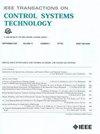基于意向一致的内陆自主船舶异步分布式避碰
IF 3.9
2区 计算机科学
Q1 AUTOMATION & CONTROL SYSTEMS
引用次数: 0
摘要
本文主要研究了自主内河船舶的协同避碰问题。提供了两种分布式解决方案。我们首先提出了一种分布式模型预测控制(MPC)算法,该算法允许船舶在同步通信框架中直接协商其避免碰撞的意图。此外,我们还介绍了一种新的方法来塑造船舶的行为,以遵守水路交通规则。交替方向乘法器(ADMM)理论保证了算法向平稳解的条件收敛。为了克服船舶间的异步通信问题,采用了一种新的异步非线性ADMM (Async-NADMM),并在此基础上提出了一种异步分布式MPC算法。仿真和现场实验表明,该算法能够在遵守交通规则的情况下,保证复杂场景下船舶间的安全距离。此外,异步算法具有高效的计算时间,满足船舶现场实验的实时性要求。本文章由计算机程序翻译,如有差异,请以英文原文为准。
Asynchronous Distributed Collision Avoidance With Intention Consensus for Inland Autonomous Ships
This article focuses on the problem of collaborative collision avoidance (CCAS) for autonomous inland ships. Two solutions are provided to solve the problem in a distributed manner. We first present a distributed model predictive control (MPC) algorithm that allows ships to directly negotiate their intention to avoid collision in a synchronous communication framework. Moreover, we introduce a new approach to shape the ship’s behavior to follow the waterway traffic regulations. The conditional convergence toward a stationary solution of this algorithm is guaranteed by the theory of the alternating direction method of multipliers (ADMM). To overcome the problem of asynchronous communication between ships, we adopt a new asynchronous nonlinear ADMM (Async-NADMM) and present an asynchronous distributed MPC algorithm based on it. Several simulations and field experiments show that the proposed algorithms can guarantee a safe distance between ships in complex scenarios while following the traffic regulations. Furthermore, the asynchronous algorithm has an efficient computational time and satisfies the real-time computing requirements of ships in field experiments.
求助全文
通过发布文献求助,成功后即可免费获取论文全文。
去求助
来源期刊

IEEE Transactions on Control Systems Technology
工程技术-工程:电子与电气
CiteScore
10.70
自引率
2.10%
发文量
218
审稿时长
6.7 months
期刊介绍:
The IEEE Transactions on Control Systems Technology publishes high quality technical papers on technological advances in control engineering. The word technology is from the Greek technologia. The modern meaning is a scientific method to achieve a practical purpose. Control Systems Technology includes all aspects of control engineering needed to implement practical control systems, from analysis and design, through simulation and hardware. A primary purpose of the IEEE Transactions on Control Systems Technology is to have an archival publication which will bridge the gap between theory and practice. Papers are published in the IEEE Transactions on Control System Technology which disclose significant new knowledge, exploratory developments, or practical applications in all aspects of technology needed to implement control systems, from analysis and design through simulation, and hardware.
 求助内容:
求助内容: 应助结果提醒方式:
应助结果提醒方式:


